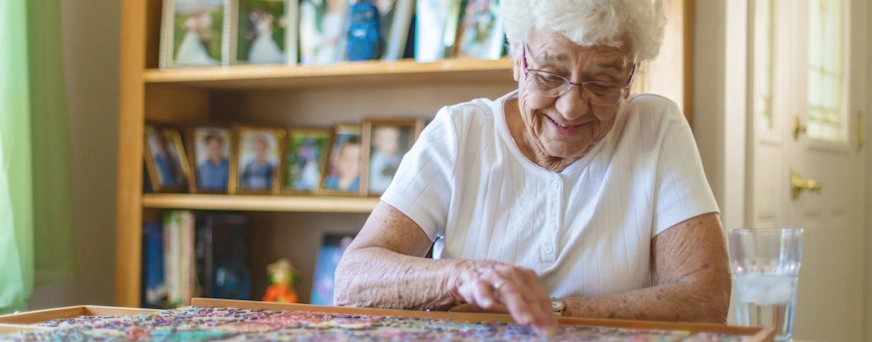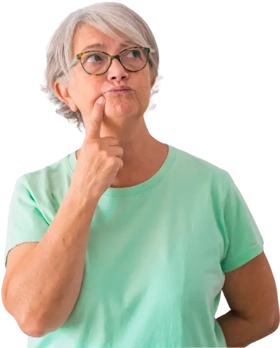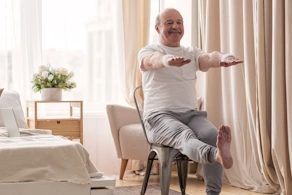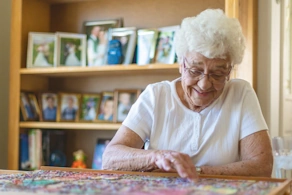Memory Test For Seniors: How To Detect Early Signs Of Dementia
Dementia is a disease that affects several families in Canada today. According to the Alzheimer Society of Canada, one million individuals will be living with dementia in 2025.Numbers are rising as more Canadians live longer. However, early checks and simple memory tests can help families act sooner. Routine talks with a doctor catch problems before daily life unravels. So watch patterns, write them down, and seek help early.
This article will guide you on the various memory tests to detect dementia early in your loved ones. Early care makes a big difference; it's just a few simple steps.
Life Assure Product Quiz
Take our 30 second quiz and discover which Life Assure medical alert device is the right fit for you or a loved ones.
Life Assure Product Quiz
Take our 30 second quiz and discover which Life Assure medical alert device is the right fit for you or a loved ones.
Early Signs Of Dementia
Noticing the first signs can feel scary. However, spotting small changes early gives families time to plan care. The following signs should be noted in the elderly member of your family:
● Repeating the same question within minutes, even after clear answers.
● Losing track of dates, holidays, or doctor appointments that were routine.
● Struggling to follow recipes, directions, or steps that once felt easy.
● Mood shifts, short temper, or worry that feels new and heavy.
● Changes in sleep, wandering at night, or daytime naps getting longer.
● Forgetting to take pills, or taking them twice.
● Trouble with remote controls, phones, or new gadgets that seemed simple.
Memory Tests To Diagnose Early Signs Of Dementia

Simple screenings help spot problems early, giving time for the next steps toward a cure. The following are some of the memory test for seniors to treat early signs of dementia:
At-Home: SAGE (Self-Administered Gerocognitive Exam)
SAGE is a paper test you print at home, and then seniors complete it. This test checks memory, thinking, problem-solving, and language in simple tasks. The test takes about fifteen minutes, which is convenient for busy caregivers.
It includes naming items, drawing shapes, and recalling information after a delay. Also, it looks at how you follow directions on a page.
Keep each test in a folder with the date for easy comparison. Repeat SAGE every few months and note score changes. A rising concern or a drop in score means it’s time to call.
At-Home: AD8 Informant Interview
The AD8 is not taken by the senior; a helper completes it. A spouse, adult child, or close friend answers eight simple yes-or-no questions. The focus is real daily change, not one tough day or a bad week.
Questions ask about memory, judgment, hobbies, and handling work-like tasks at home. Also, it checks whether the senior seems different from one to three years ago. Scores help flag possible decline and guide next steps with a doctor.
You can repeat the AD8 to track change over time, which is helpful. However, the AD8 does not diagnose a disease by itself. It simply raises a clear, practical signal.
Professional: Mini-Cog
The Mini-Cog is a quick screen used in clinics across Canada. It combines two parts: three-word recall and a clock drawing task. The visit feels short and friendly, which seniors often prefer.
First, the clinician says three words; the person repeats them right away. Then the person draws a clock showing a set time, like 10 past 11. After drawing, they try to recall the three words from earlier.
The clinician looks at recall and the clock’s layout for early clues. Also, results guide whether more testing is needed or not yet. On the other hand, a normal Mini-Cog still needs watching if concerns persist.
Professional: MoCA (Montreal Cognitive Assessment)
The MoCA digs deeper into early changes and mild cognitive issues in the elderly. It checks memory, attention, executive skills, language, and visuospatial abilities together. Many Canadian primary care teams and memory clinics use it during workups.
The tasks feel brief; however, they cover a wide range of brain skills. It includes delayed recall, number sequences, and drawing a cube. The score can show subtle changes that older tests might miss.
Also, trained clinicians interpret the result using the age and education context. A single score is helpful, but trends over months matter even more. Families should keep copies and share them during medical wellness visits.
Professional: MMSE (Mini-Mental State Examination)
The MMSE remains common because it is quick, familiar, and well-structured for seniors. It covers orientation, attention, recall, language, and simple figure copying tasks. Clinicians often pair it with the MoCA or Mini-Cog for balance. Also, the MMSE helps track change over time in a clear way.
However, it can miss very early changes, especially in complex daily tasks. A modest drop from a person’s usual baseline still deserves attention. For instance, a long-time bookkeeper struggling with dates may need more screening.
What Do These Tests Exactly Evaluate?

These tools check how the brain learns, plans, and talks. In addition, they show which daily tasks need support.
Short-Term Memory, Recall, And Attention
Memory tests look at how seniors learn new words and keep them briefly. After a short break, they ask for the words again to see recall. Also, simple number tasks test focus and steady attention during easy steps.
However, repeating a screen shows patterns, not one bad day. In addition, notes from family give context about real-life slips, like missing bills or pills, in Canada.
Executive Function And Cognitive Flexibility
Checks of executive function look at planning, sequencing, and problem-solving. They ask seniors to follow steps, switch rules, and adjust quickly. Also, simple puzzles reveal flexible thinking and how well people shift attention.
Tasks may include sorting, timed switching, or drawing with clear instructions. However, one rough day should not define ability; patterns matter most.
Language And Word-Finding
Language checks ask seniors to name pictured items, describe actions, and find words within time. Also, short conversations and direction-following show their understanding and expression.
Reading a sentence, repeating phrases, and writing a line reveal grammar, clarity, and speech flow. In addition, word lists by category uncover retrieval speed and stuck moments.
However, hearing loss, dry mouth, and stress can cloud results, so clinicians review medical history and family notes during visits.
Visuospatial Skills And Construction
Visualspatial checks look at how seniors in Canada understand shapes, distance, and layout. They copy figures, draw a clock, or place lines at angles.
Also, tasks ask them to scan a page and spot differences. They judge left and right and keep spacing. However, poor lighting or cataracts can muddy scores, so clinicians note vision first.
Conclusion
Early screening protects safety and independence. These memory test for seniors help to detect dementia in the early stages. If patterns persist, ask for a complete consultation and local support. Small, steady steps today shape kinder tomorrows.











 Get Help With The Push Of A Button
Get Help With The Push Of A Button













